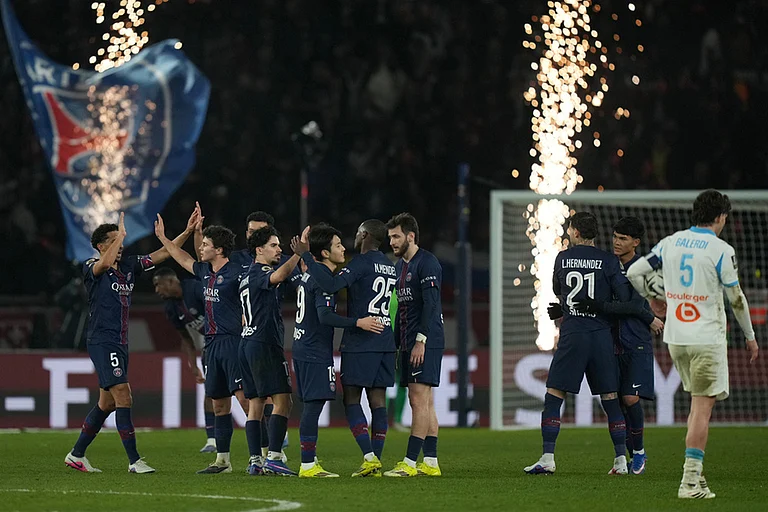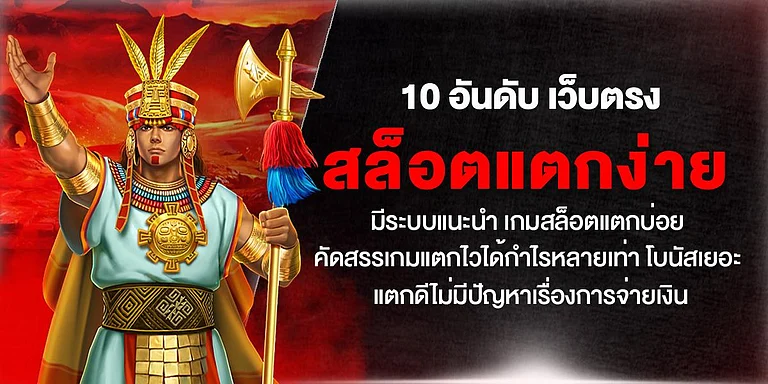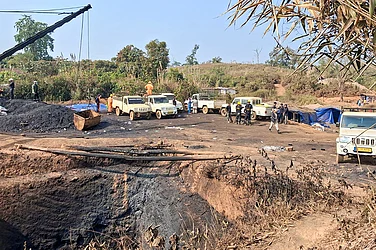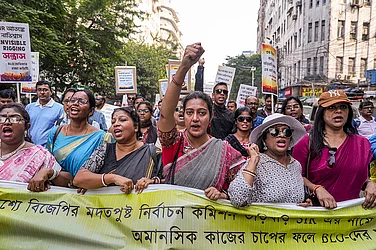At present, the Bombay underworld is dominated by four gangs whose leaders control their outfit by remote control. Dawood Ibrahim runs his operations from Dubai and Karachi. His arch rival is Arun Gawli who functions out of the Yerawada prison in Pune. Gawli has now found an ally in Chotta Rajan, Dawood’s trusted lieutenant, who now runs his own operations from Malaysia, Singapore and Hong Kong. The fourth major group is known as the Naik Company and is run by the Naik brothers, Amar and Ashwin. Amar Naik is absconding and is believed to be in Bangkok from where he directs operations.
Unlike in the past, the gangs have not demarcated the turf in which they operate. All the four main gangs are involved in real estate, protection rackets, contract killings and drug rackets (see box). This has led to a mad scramble among the gangs for their slice of the pie. Also, the fragmentation of the D Company following the blasts and the polarisation of some non-Muslim members of the mafia have intensified the inter-gang rivalry.
Extortion under the guise of extending protection is a major money-spinner. According to National Human Rights Commission (NHRC) estimates, the underworld collects Rs 50 lakh a day as protection money from the business community. The annual take from this single area of operation is Rs 182.5 crore. Last year, there were as many as 588 cases of extortion reported to the police. Till June this year, 273 cases were recorded. But the figures don’t give the complete picture since most victims don’t approach the police. Says NHRC chairman Justice Ranganath Mishra: "The mafia is posing a serious law and order threat that could ultimately become a human rights problem."
The hardest hit by the underworld is the business community. The emergence of a large number of cash-rich but as yet unestablished business persons has provided mafia gangs with easy targets. Builders, hoteliers, traders and those who run their own factories are tapped for funds by the underworld and sometimes the businessman, caught between rival gangs, ends up paying with his life for favouring one gang or the other. This, says the police, is probably what happened to the managing director of East West Airlines.
Wahid was known to be close to Dawood Ibrahim and the police suspect the murder was masterminded by Chotta Rajan, a one-time associate, but now a rival of the don. The Bombay police has so far not succeeded in arresting the killers and has announced a reward of Rs 2 lakh for information that would lead to the arrest of the five-member team that carried out the killing. Surprisingly,the police did have an inkling that Wahid's life was in danger and had even warned him, though in vain. Says a senior officer who is heading the investigations into the killing: "I personally warned him one-and-a-half months ago. I told him that there was a threat to his life and he should take our protection. He refused." For well over a year, Wahid had been working hard to dispel the impression that East West was being funded by Dawood. He did not wish to add to the speculation by accepting police protection on the grounds that he could become the target of gangs opposed to Dawood.
According to R.S. Sharma, joint commissioner, crime, the current thread of investigation the police is working on is that Wahid was targeted by Dawood's rivals because East West Airlines was suspected to be the financial nerve-centre in India of the D Company, as Dawood's outfit is referred to. The police theory is that Wahid was eliminated in retaliation for the September killing of OmPrakash Kukreja, an alleged financier of Chotta Rajan, by the D Company. This is seen by the CBI officials as being a rather simplistic conclusion but Police Commissioner R.D. Tyagi points out that retaliatory killings are not new in the underworld. Says he: "In the normal course, such retaliation may not have taken place. But with the split in the Dawood gang, such killings are becoming common."
However, CBI officials who have been investigating East West have a different theory which the city police are also pursuing. They feel Wahid may well have been eliminated by the D Company itself. CBI sources say the Wahids, in trouble and under pressure, had been trying to distance themselves from their under-world friends. The killing was perhaps a warning. Also, according to CBI sources, the D Company suspected that the Wahids might cooperate with the investigating agencies probing Dawood's activities.
The Wahid family, however, still denies any underworld links. Nasiruddin Wahid, the elder brother of Thakiyuddin and chairman of East West, has been critical of the allegations made by the police that his brother was killed as a result of inter-gang rivalry. According to him, the murder was planned by business rivals who were jealous of East West's success. But that is a theory the police are not ready to buy. They cite the fact that early this year, six persons linked to Dawood were arrested in Delhi. One of them, Mohammed Ahmed Mansoor alias Suhail Ahmed, spoke of the nexus between East West and the D Company in his confession. Mansoor's statement to the investigating officials led to the arrest of the airline's regional manager in Delhi, Sabu Chacko.
Mansoor, who was handling Dawood's hawala deals in Bombay, claimed he had paid Rs 5 crore in cash to East West in instalments between June and August 1992. Another sum of Rs 1 crore, he said, was personally paid by him to Thakiyuddin Wahid. He said, onMarch 17, 1992, he had stayed in Hotel Plaza, Delhi, in a room reserved and paid for by the airline. Mansoor also claimed he received Rs 10,000 a month from East West and that his flat in Delhi was furnished by the airline. He told the CBI that he had collected Rs 5 lakh from Chacko which he paid to Sunil Sawant, a Dawood hitman, in May 1993. Later he had paid an additional sum of Rs 10 lakh to Sawant. Mansoor confessed that he had instructions from Dawood to contact Chacko whenever the gang needed money. This confession led to the arrest of the regional manager.
The Wahids dismissed the allegations as false and maintained that their records, checked by the investigating agencies, would corroborate that. Declared Faizal Wahid, director, marketing, East West: "We have nothing to hide." But the killing has brought back into focus the suspected underworld links of the airline which was on the threshold of a major image overhaul.
The focus is also back on the inter-gang rivalries leading to incidents of shooting and the constant threat to businessmen. Says Julio Ribeiro, former police commissioner who took a tough stand against the dons during his tenure: "They have moved from killing each other to killing each other's economic nerve-centres. There must be some reason why they have resurrected their activities—perhaps it's the need for money and muscle and the encouragement by people in authority."
The fatal attack on Wahid was followed by an attempt on a builder from suburban Dahisar. He managed to foil the armed intrusion into his office by firing at the hitmen. Builders, particularly new entrants in the business, have become prime targets. Says former municipal commissioner S.S. Tinaikar: "Contract killings have become a part of Bombay's life—at least one person a month is bumped off. Earlier, money and women had a role to play in the killings. Today it's real estate. The shift is towards land. It's a mystery why this happens in Bombay. It doesn't happen in Bangalore."
The situation worsened ever since the killing of industrialist Sunit Khatau in May 1994. Equations in the underworld have undergone changes and this has led to business persons being suddenly classified as sympathisers of one faction or the other. One alarming trend, say the police, is that the underworld is now divided along communal lines. On one side is Dawood and, on the other, gangs which describe themselves as non-Muslims: the Arun Gawli gang (said to have links with the Shiv Sena), Chotta Rajan and Bhai Thakur who have left the D Company, and the Amar Naik-Ashwin Naik group. Chotta Rajan and Bhai Thakur have teamed up with Gawli. The Naiks are anti-Dawood but have decided not to tie up with Gawli because of old rivalries. Says Sharma: "There is every possibility of the till now 'secular' underworld getting divided on religious grounds with the Hindus on the side of Chotta Rajan."
The 'communal divide' appeared immediately after the March 1993 blasts. Chotta Rajan, till then a Dawood lieutenant, broke away in an attempt to establish his own empire. The police say ever since Dawood was blacklisted following the blasts, there has been strong pressure on the D Company's non-Muslim members to quit. Says a senior police official: "The crackdown on the D Company made it difficult for Dawood's men to operate and people like Chotta Rajan decided to quit." The underworld buzz is: the police are not as severe on the other gangs as they are on the D Company.
As a result of police pressure, the D Company has started basing its hitmen outside Maharashtra and brings them down to Bombay for operations. "The trend today is not to remain in Bombay after any killing," says a senior police official. Uttar Pradesh, Madhya Pradesh and Karnataka are seen as safe points to operate from. This explains why the Bombay police have had to go to places like Indore to arrest D Company sharpshooters. Three groups of contract killers were arrested in Bangalore earlier this year.
But the D Company is only one part of the underworld. With the number of outfits increasing, the businessmen fear they will have one too many people to appease. For some time now a section of the business community had been using the underworld's muscle power to get its dirty work done. Now the threat of being trapped in the crossfire of gang rivalry looms large.
The crime branch has decided to issue a list of dos and don'ts to business people under threat. Over a hundred people in the city will be cautioned and some of them may be provided police protection. The police feel the Wahid murder is not an isolated incident and that there's more bloodshed in the offing. Especially for those who have links with Bombay's murky lower depths.






















